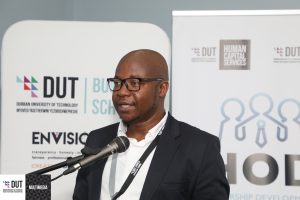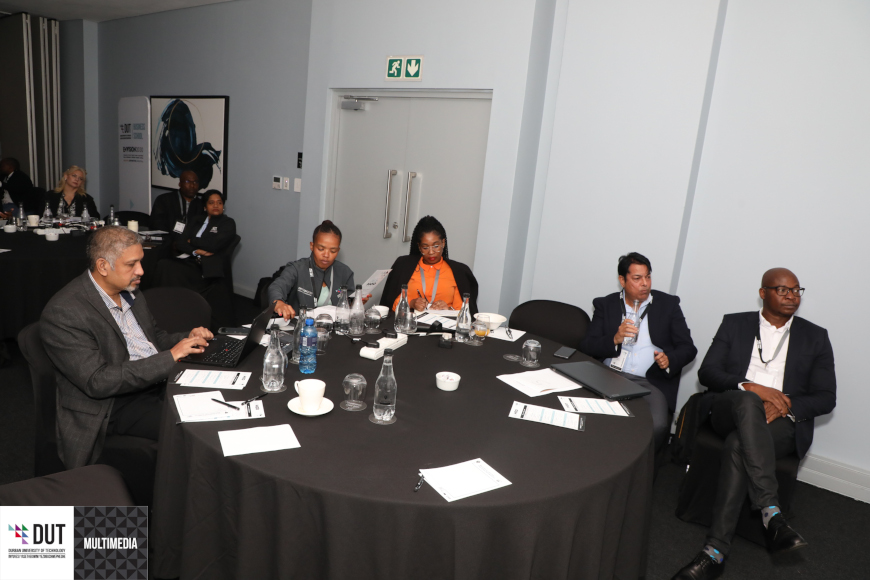The Durban University of Technology (DUT) Business School, in partnership with Human Capital Services (HCS), recently hosted a successful Head of Department (HOD) Leadership Development Programme. The initiative aims to strengthen the identity and voice of HODs, encouraging a sense of ownership and collaboration in academic leadership.

Mr Avhatakali Nenungwi, Director of Organisational Development and Talent Management at DUT Human Capital Services.
Mr Avhatakali Nenungwi, Director of Organisational Development and Talent Management, facilitated the programme and warmly welcomed attendees. He expressed gratitude to all participants for committing to the programme, noting its importance in building experience and knowledge particularly for new HODs who benefit from the insights of seasoned leaders.
Dr. Sean Jugmohan, representing the DUT Business School, shared an insightful overview of the HOD Programme, highlighting the challenges that many new Heads of Department face when stepping into leadership roles. He acknowledged the struggles many new HODs face due to a lack of structured induction, clear policies, and mentorship. This often leads to burnout and isolation, discouraging others from aspiring to leadership roles. Jugmohan emphasised that this reality discourages potential leaders from stepping forward, as they witness the visible toll the position can take on their colleagues.
To address these concerns, Jugmohan proposed a more collaborative and supportive leadership development approach. He introduced initiatives such as Heads Up and Talking Heads, which aim to create spaces for networking, mentorship, and shared problem-solving among HODs. Drawing on his own experiences, he emphasised the importance of structured mentorship, communication, and creating enabling environments through collective efforts and institutional support. The programme seeks to shift negative perceptions of the HOD role and empower academics to take on leadership with confidence, connection, and a clear sense of purpose.
Professor Fulufhelo Netswera, Executive Dean of Management Sciences, delivered his message virtually via MS Teams while abroad. He contextualised academic leadership by highlighting a critical gap in the higher education system namely, the absence of a formal HOD development programme. “This is one of those stopgap measures, and it might not be sufficient,” he stated. He argued that leadership cannot be left to chance, and institutions must intentionally develop leaders. While not everyone is suited to become an HOD, those committed to mentorship, teaching, and scholarship should be identified and supported.
Professor Netswera described an ideal HOD as someone who walks the talk, uplifts colleagues, builds academic networks, and understands the local and global research landscape. He stressed the importance of humility, adding, “If you don’t get excited when others are excelling, then there is a problem.” He further urged HODs to familiarise themselves with key institutions like the Council on Higher Education (CHE), the National Research Foundation (NRF), the Medical Research Council (MRC), and others, emphasising the value of informed and collaborative academic leadership.
Closing the session, Mr. Musawenkosi Mkhwanazi, Interim Senior Director for Capital Services, delivered an over of HCS functions, services, and business processes to HODs. He stated the need for streamlined processes across recruitment, performance monitoring, and staff records. “We want to migrate all of these systems into one integrated platform,” he explained. Mkhwanazi highlighted the importance of accountability. He explained that the HOD must take the accountability to know their staff and departmental operations, stating, “If there are ghost employees, it is your fault you need to know who is working for you.”
He also elaborated on the role of the Organisational Development (OD) unit within HCS, which oversees transformation, change management, performance appraisal, and staff development. He explained that OD is there to help develop leadership and management capabilities among staff. He concluded by reminding HODs of their responsibility as people managers, encouraging them to define clear goals and collaborate with HCS to nurture high-performing academic teams.
Among other key speakers present were Professor Ashley Hilton Ross, Associate Professor, who spoke on DUT Envision 2030; Dr. Norman Ronald, Senior Director of CQPA, who addressed the Academic Quality Promotions Function; and Dr. Shoba Rathilal, Interim Director for CELT, who presented on key factors for ensuring excellence in learning and teaching. Mr. Thabani Mhlongo, Senior Director of REM, discussed Real Estate Management; Professor Mohohlo Tsoeu, representing the CIO, outlined key ICTS functions, services, and business processes; and Mr. Musawenkosi Mkhwanazi, Interim Senior Director of Human Capital Services, presented on the functions, services, and business processes of HCS.
Pictured: Attendees of the HOD Workshop.
Photographer: Multimedia
Sinamile Sithole

